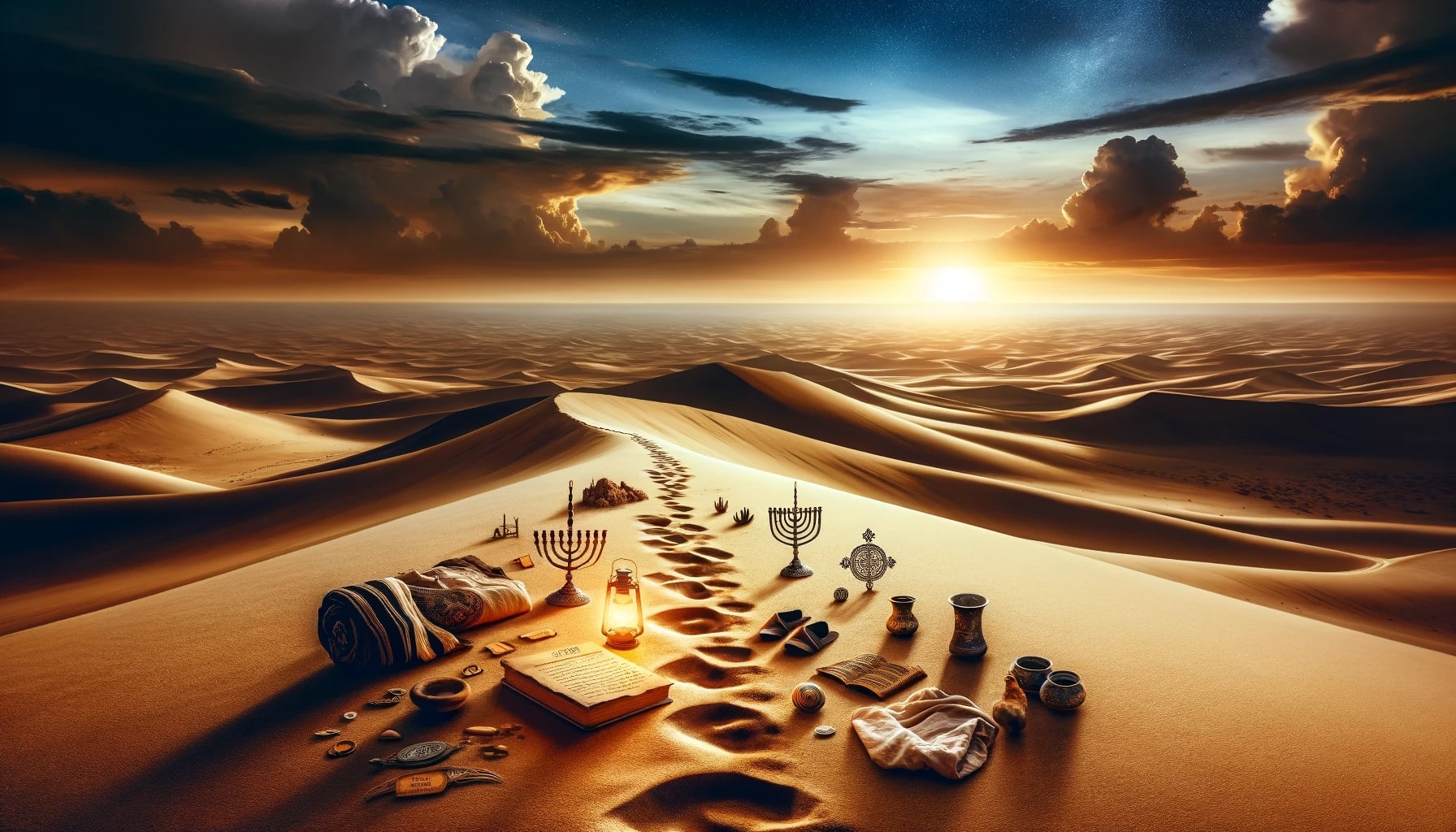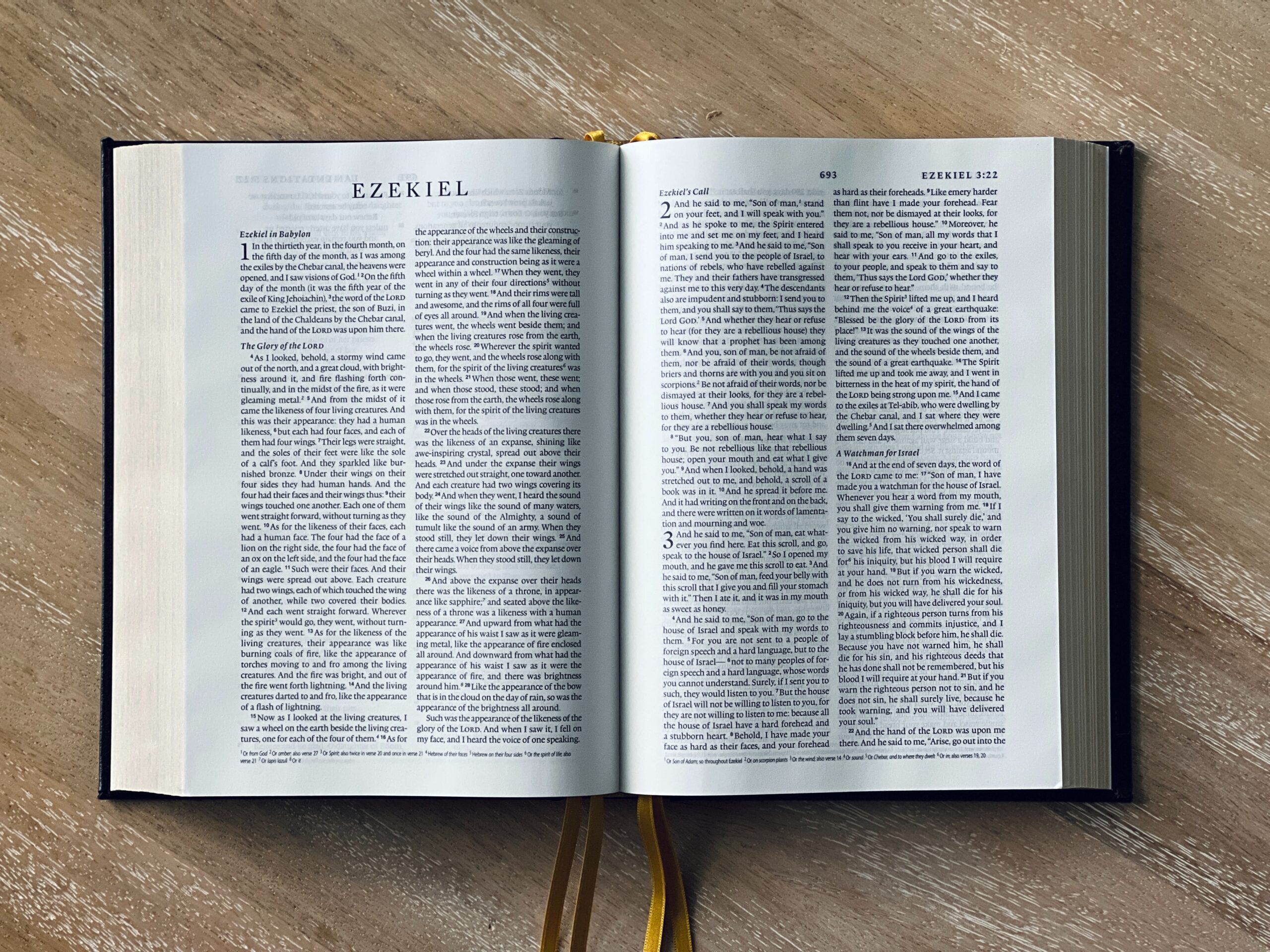| Getting your Trinity Audio player ready... |
Question:
My question is, Rabbi, it seems that you support religious Zionism. [Yes] Can you explain why there seems to be many religious Jews who are anti-Zionist today and in the past, and why you agree or disagree with this view?
Thank you for that question. The question really is, Tanakh teaches that at the end of days, the Jewish people would return back to the Land of Israel, would come home. It’s everywhere in the Prophets, we would return, we would be exiled but one day we would come home back to the Holy Land. My love for this Land is very unique. In fact, my love for Eretz Yisrael is completely transcendent. And it’s not even what I love or admire, it’s who I am. And it’s not because of some nationalism or pride in being a Jew, or the Jews did that or this. It’s that it’s the fulfilment of a promise. A promise found in the Jewish Scriptures is that you are coming home, you’re coming back to Eretz Yisrael. I will gather you and I’ll find you from the furthest most islands. I’ll bring you home, see, Isaiah, chapter 43, verse 5,6,7. It’s all there. And in fact, when the people of Israel are in their homeland, nations will go to war with them, and they’re not going to go to war with us about Tel Aviv. That’s not going to be the core issue. It’s not going to be about Eilat or Herzliya. It’s going to be about one city, and that’s Jerusalem. The nations will go to war with the people of Israel. See Zechariah chapter eight; see Zechariah chapter 12.
It doesn’t go well for those who come to war against Eretz Yisrael. The enemies of God are destroyed. And it may appear as though it would be impossible for the children of Israel to succeed but Hashem is going to make even the weakest of the Jewish people like David, even like the angel of the LORD of hosts. See Zechariah chapter 12 verse eight and nine. So Tanakh, very vividly, there’s no other way to read these chapters. I just made reference to Zachariah eight and twelve, tell us that the Jews will be in the Land of Israel; and nations will come and go to war with Jerusalem and Jerusalem be a heavy burdensome stone to all nations that come against it. And it’s my hope that people turn to the God of Abraham, Isaac and Jacob.
So there’s nothing could be more transparent, that triggers are coming of Moshiach. So the Jews have to return back to the Land of Israel. We then, mean this has never happened after thousands of years that a people returned back to their homeland. So to love Eretz Yisrael and understand that it’s the Hishalta HaGeula, the dawn, the trigger, the genesis of final redemption. It’s not even, if you read the text, read Ezekiel 38 and 39. It is explicitly there, explicitly there. This is not like some, like you have to read anything into it. It says everywhere, the return of the Jewish people. But, after a sizable portion of the Jews return, nations go to war with Jerusalem, and they’re defeated.
So that’s why I love Eretz Yisrael, not because it’s my place or the Jews won anything. It’s not this, I’m not a secular Zionist. My love for this Land is completely drenched in my love for HaKadosh Baruch Hu; they’re intimately connected. I’m not just speaking for myself, but speaking for other religious Jews who have a deep love for Eretz Yisrael. There are secular Zionists, I don’t share their view and to them it’s just the national aspiration of the Jewish people, and God is not a part of it. And certainly, you know, that the Jews control their own destiny, which is not only not a part of it, that’s antithetical to it. The only reason that these events have occurred is because of God, not because of an Israeli army. God just uses these as tools. But Hashem says, you will return, the Book of Deuteronomy, even though terrible things will happen to you. One day you will return. That’s the promise.
And the promises of restoration. It’s really everywhere in Tanakh. And I’m afraid there are just not enough people; I’m criticising my own, who are reading the Book of Zechariah and Ezekiel. They’re not, they’re not reading it enough. And this is not like reading anything into the text. I’m taking the most simple, clear texts, plain passages that the children of Israel will return and nations will go to war against Jerusalem, and they’ll be defeated. I mean, there’s like, if any reasoned mind would read these chapters, they would understand them.
Now, the question is, why are there some religious Jews who are not religious Zionists, who are anti-Zionist? So I think there are, in my opinion, there are two reasons for this. Because the early Zionists were largely not religious Jews. Now, in truth, that during the 1800s there were many religious rabbis who were very supportive of the return of the Jewish people to the Land, and that is part of a Messianic hope. And in fact, you can trace this back to teachings of Nachmanides and so on. But modern Zionism, the people who went with this were people who were largely (not all) but largely not religious, they were secular. And I completely understand why there would be people who would say, ‘There’s no way in the world God would work with people like Herzl, would use some of my Herzl.’ I understand that.
Now, things have changed dramatically in the Jewish religious world. But the vast majority of religious Jews have a deep love for Israel and have an understanding of, this has changed dramatically. But could I understand why, at the end of the 19th century and early 20th century, people, religious Jews would observe a (not all) but a largely non-religious movement, saying let’s return to the Land of Israel and saying, ‘These people are completely secular. And these people are dangerous and don’t go to Palestine, because you’re going, you’re going to get killed. Palestine is going up in flames.’ Well, it didn’t. It was, this would have been the safest place to be during World War Two, right here in the Land of Israel.
But, you know, I can understand how people could see a movement that was not; now there were many religious Jews who were devout Zionists, Rav Kook, the Netziv (the head of the Volozhin Yeshiva). These are the disciples of the Vilna Gaon, who were very much religious Zionists. This was not like everybody was anti-religious, is not true. But I definitely can understand how people will go, ‘There’s no good thing that can come from this movement that was largely secular.’ And you have the religious Zionists at a very early stage, I think in 1906 [1902], that’s really, that’s pretty early. Would form the Mizrachi movement, which was a religious Zionist movement. So it wasn’t like everybody. I think that probably was a contributing factor to it, that they just couldn’t read it.
And you go, what was wrong with that read? This is my view, is that, again, if you are entrenched in the Navi, meaning you’re reading books like Ezra and Nehemiah, which I’m afraid are just not studied as much as they could be among religious Jews. You would discover that the vast bulk, a huge bulk of the Jews who came to build the Second Temple were not religious. So, in my view, it’s because there has not been a devotion to studying books like Ezra, Nehemiah, which is really one book. And our Sages tell us that the coming of Moshiach, what will occur in the Messianic age, how will it occur, the secret is told in the Ketuvim, in the Writings section of our Jewish scriptures. That should have been a hint to everybody that: let’s study that! Let’s study Ezra-Nehemiah really carefully if we want to know about the Messianic age, like what could we expect? And I’m afraid that not enough people were studying these books, or studying them as though, it’s easy to read Ezra-Nehemiah, which read as though it’s a history of events that occurred in the building of the Second Temple. It’s halting, its pause, and then final construction. And that’s really what Nehemiah is really dealing with that. You know, at first they had Cyrus’s command, go, build, go back, build Jerusalem, build a Temple, build the walls, go build it. And then unfortunately, the Persian Empire would take a turn and sort of go back on the declaration, and then ultimately, it would, it would continue. That’s well, who are the Jews who left Babylon to come to Israel? Now there were religious Jews among them, like Yehoshua Ben Yehotzadok, the high priest, the nephew of Ezra, Zerubavel, Davidic dynasty, there were a lot of holy people. But it wasn’t largely that way. And the Navi, listen, listen, listen up. Tanakh, especially the Ketuvim, wants you to know this. This is the problem. The Ketuvim, the Writings section, for some reason, wants you to know that a bulk of Jews, a significant number of Jews who left Babylon, who left Brooklyn, who left Hungary, who left Poland and came to the Land of Israel to build the Second Temple were non-religious Jews. Read Nehemiah chapter 10. Read Nehemiah chapter 13, read Ezra chapter 10.
And I turn to you, my dear brothers and sisters and ask, why is this in the Bible? Why is this in the Tanakh? Why is it there? Like? If there is not some Messianic description here, then I encourage you to stop and think, why are we told that the Shavei Tzion, these people from the 42,360 Jews who returned back to Israel from Babylon, to build a Second Temple, why is it germane to mention in the Tanakh that they were not religious? They married non-Jewish women, we know who they were, they’re mentioned in the Book of Ezra, and Ezra was not happy about it. We know their names, they’re identified, married non-Jewish women, that’s pretty serious. One of them was Yehoshua’s own son. I’m not kidding. Now, I’m asking you, if you disagree with me, why would Ezra-Nehemiah be concerned with conveying this information? What do you do with it? What have you done all your life with the Book of Nehemiah? Like, how did you understand these passages? Like, I’m not asking you how did you understand what it says. These are very easy books to read. L’havdil they’re not like reading Ecclesiastes which poses some challenges, it’s not as easy to read. It’s not like reading much of Isaiah, which really, it’s poetic, this is not that, this is not written with poetry. This is written with a standard pros telling us about history, why is this relevant to us??
And I would encourage you to consider that it is. I would encourage you to consider that Chazal, our Sages of blessed memory, considered the Ketuvim, the Writings segment of Tanakh to be so revealing that they withheld a Targum, a proper Targum, like Yonason ben Uzziel of the Writings section, because it would give away the End, it would give away the Messianic Age. And it had to remain hidden, we now know. But if you’re asking me, why did religious Jews oppose the return of the Jews to Eretz Yisrael? I understand why, I really do get it. But I do believe that there is a relationship between not studying the Nach part of the Hebrew Bible as much as you could. And it would be that lack of study of the Book of Ezra-Nehemiah that people would not, may not have picked this up, I just can understand it. I could understand it.
Moreover, you have Jacob’s Trouble, Jeremiah 30:7 which tells us that there’s a day coming, which is going to be the worst moment in history, nothing as bad as that. And from this worst trauma in history, will come your salvation, deliverance, we have to make sense out of that. So I think, I think that’s a part of the reason.
And then there was a very influential Rabbi, the Satmar Rebbi, of blessed memory, that his view, is a very influential personality of the 20th century. His view was based on the Talmud in tractate Ketubot that there are three vows on the Jewish people that would bind them. Two of the three vows would bind the Jews, and one of them would bind the Gentiles. During our exile that the Jews should not rebel against nations in our exile. And we should not come from outside the Land of Israel to come into the Land of Israel to and fight the Gentiles on the way in. And that the nations of the world, is based on a passage and in the Song of Songs, in turn, should not oppress the Jewish people. Well, there is a reciprocal for this, if the Jews are already in the Land of Israel. Two, the nations voted on this, they literally vote! I don’t know of any other country like this. They vote in a Partition Plan, majority ruled. Why, why did God do that? What, we need United Nations? God needs United Nations? Well, based on this Talmud, they do. So the nations voted for it. Conversely, the nations of the world abrogated their side of the deal by oppressing the children of Israel, culminating in the Holocaust. And believe me, in the frum [religious] world, the Jews were plenty oppressed, it’s not like; just the Holocaust was so huge that. So this is a view that had enormous influence. And that continues today to this day. It is a view that I disagree with and again, I think if you just go back to Tanakh, and [if] you’re going, ‘Well, don’t you need the words of the [rabbis]…’? Well, all the Sages said, that while, this is very important. – Well [objection]: ‘But these are, there are big rabbis who didn’t agree with you going back.’ Chazal (our Sages) always said that when we read Messianic prophecy, although we understand what’s going to happen, the national, the universal knowledge of God, the restoration of the Jewish people to their Land, the building of the Temple, all the we understand the basic things, but how are they going to happen? And how exactly do we interpret Zechariah 14? All the commentaries, in one voice say that there are details that we are reading in the texts, that we will not understand in detail what they mean until they occur. This is not like, my view. This is not a view of a Jew in Jerusalem. This is what Chazal our Sages all said.
Now, then why mention it? Because when it happened, you’ll go, ‘Well, oh, there it is.’ That’s the point. The point is these are identifying features so that when it occurs, when a bulk of Jews come to the Land of Israel, and they’re not religious Jews, and they come after, they come to the Land of Israel, and ultimately the nations of the world vote for, so you would know! So you can identify it. That’s why. So that I think contributes to this view. It’s not, it’s a view that I understand how this could have happened. But I think that if you are well ensconced in Nach, which is not studied as much as it could be, and you who are a religious Jew know this, this could create a problem. That’s the reason. Thank you for your question.













